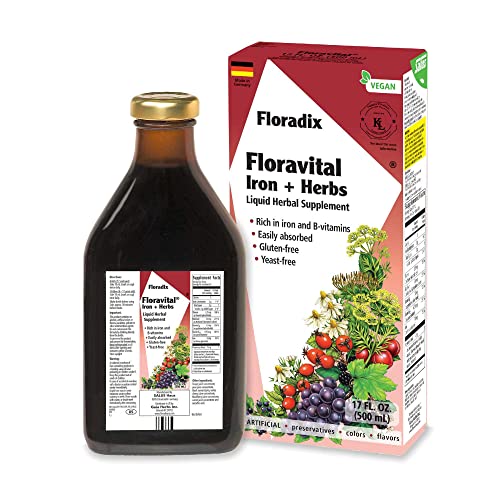
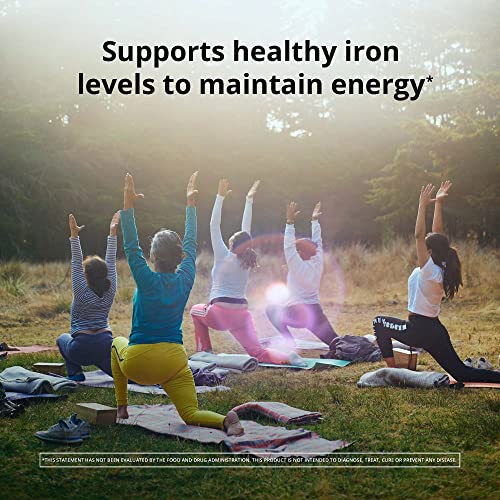
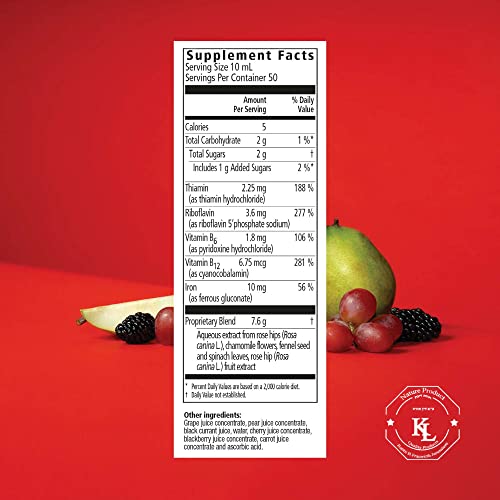


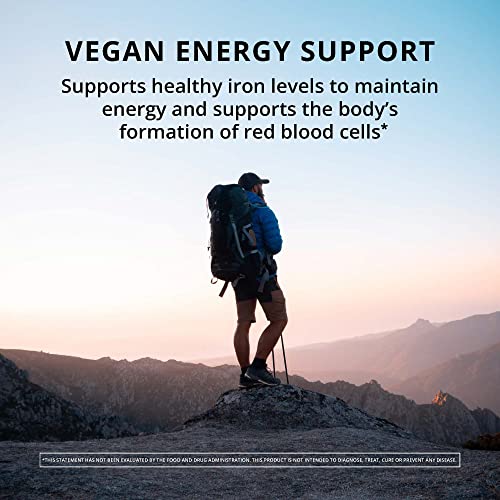
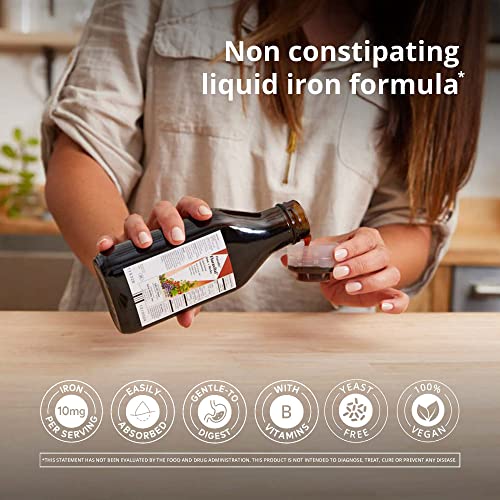
Floradix Floravital Iron & Herbs - Energy Support with Vitamin C & B Complex - 17oz


Chamomile Flowers
High RiskChamomile flowers are derived from the flowering heads of the Matricaria chamomilla plant, primarily utilized for their potential calming effects and anti-inflammatory properties. They are commonly used in herbal teas, skincare products, and dietary supplements.
Sustai Insights
Chamomile flowers offer functional benefits, including anti-inflammatory and calming properties, making them popular in herbal remedies. However, they carry a high allergenic potential, particularly for individuals with ragweed allergies, and can cause skin irritation. Environmental risks are low, as they are not known pollutants. Regulatory status is favorable, with no current restrictions. Overall, the ingredient presents a high risk profile, particularly concerning allergies, necessitating caution in usage and consideration of alternatives such as calendula for those sensitive to chamomile.
Rose Hips
Medium RiskRose hips are the fruit of the wild rose plant, commonly used in dietary supplements and cosmetic products. They are known for their rich content of vitamins, antioxidants, and essential fatty acids, often utilized for their potential health benefits, including skin nourishment and anti-inflammatory properties.
Sustai Insights
Rose hips offer functional benefits such as being a source of vitamins and antioxidants, which may support skin health. They are generally considered low risk for carcinogenicity and developmental toxicity, but there is a moderate potential for allergies. Environmental risks include low bioaccumulation. Regulatory restrictions are minimal. Overall, the ingredient presents a medium risk level, with safe usage recommended for most consumers, while alternatives like hibiscus may be considered for similar benefits.
Iron
Low RiskIron is a mineral that plays a vital role in various biological processes, primarily as a component of hemoglobin in red blood cells, facilitating oxygen transport. It is commonly used in dietary supplements and food fortification to address iron deficiency and support overall health.
Sustai Insights
Iron offers essential functional benefits, such as improving oxygen circulation and supporting metabolic processes. It is generally considered safe with low risks for carcinogenicity, allergenic potential, and reproductive toxicity. Regulatory bodies like the FDA do not impose significant restrictions on its use. However, excessive iron intake can lead to health risks, including toxicity. Environmentally, iron is not known to be a pollutant or bioaccumulative. Overall, iron is assessed as low risk, with safe usage practices advised, including monitoring intake levels. Alternatives for supplementation include dietary sources like spinach and legumes.
Riboflavin
Low RiskRiboflavin, also known as Vitamin B2, is a water-soluble vitamin essential for energy production and cellular function. It plays a critical role in the metabolism of fats, carbohydrates, and proteins, and is commonly used as a dietary supplement and food additive for its color and nutritional benefits.
Sustai Insights
Riboflavin offers functional benefits, including its role in energy metabolism and as a food colorant. It is generally recognized as safe with low risk for allergies, carcinogenicity, and reproductive toxicity. However, excessive intake can lead to minor side effects such as yellow urine. Environmentally, riboflavin poses low pollutant potential and is not bioaccumulative. Regulatory bodies like the FDA have approved its use, establishing a low risk profile overall. Recommended usage levels are safe, and alternatives include other B vitamins, ensuring a balanced intake.
Ascorbic Acid (Vitamin C)
Low RiskAscorbic acid (Vitamin C) is a naturally occurring antioxidant essential for various biological functions, including collagen synthesis and immune response. It is commonly used in cosmetic and food products for its preservative properties and ability to enhance skin brightness.
Sustai Insights
Ascorbic acid provides functional benefits as an effective antioxidant and preservative, contributing to skin health and product stability. It is generally recognized as safe with low health risks, including minimal concerns for carcinogenicity and allergies. Environmentally, it poses low risks, as it is biodegradable and does not bioaccumulate. Regulatory bodies like the FDA have not imposed significant restrictions on its use. Overall, the ingredient presents a low risk, with safe usage practices ensuring consumer safety, and alternatives such as natural extracts exist for those seeking different formulations.
Thiamin
Low RiskThiamin, also known as vitamin B1, is a water-soluble vitamin essential for carbohydrate metabolism and nerve function. It serves as a coenzyme in the conversion of food into energy and is important for maintaining healthy nerve cells and muscle function.
Sustai Insights
Thiamin plays a crucial role in energy metabolism and supports nerve health, with minimal associated health risks such as low carcinogenicity and low allergenic potential. It is not currently subject to restrictions by regulatory bodies. While thiamin is not known to pose significant environmental risks, its production should be monitored for sustainability. Safe usage practices include ensuring adequate dietary intake, particularly in vulnerable populations. Given the overall low risk associated with thiamin, it is considered a safe ingredient in product formulations.
Cyanocobalamin (Vitamin B12)
Low RiskCyanocobalamin, commonly known as vitamin B12, is a water-soluble vitamin essential for red blood cell formation, neurological function, and DNA synthesis. It is utilized in dietary supplements and fortified foods to prevent or treat B12 deficiency, particularly in individuals with limited dietary intake or absorption issues.
Sustai Insights
Cyanocobalamin serves critical physiological functions including energy metabolism and red blood cell production. It is deemed safe with low health risk concerns across various categories such as cancer, allergies, and reproductive toxicity. Environmental impact is minimal, lacking bioaccumulation or significant pollutants. Regulatory bodies, including the FDA, recognize its safety, affirming low risk overall. Recommended usage involves adherence to established dietary allowances, with few noted alternatives. Therefore, the overall assessment indicates low risk.
Pyridoxine
Low RiskPyridoxine is a substituted aromatic compound, primarily known as vitamin B6. It plays a crucial role in various metabolic processes, including amino acid metabolism, neurotransmitter synthesis, and the production of hemoglobin.
Sustai Insights
Pyridoxine serves essential functions in metabolic processes and is vital for overall health. It poses low health risks, with minimal concerns related to carcinogenicity, allergies, or reproductive toxicity. Environmentally, it is not considered a pollutant or bioaccumulative. Regulatory bodies have not imposed significant restrictions, indicating a low risk overall. Safe usage practices are encouraged, and alternatives like other B vitamins can be considered.
Water
Low RiskWater is a clear, colorless liquid essential for various biological processes. It serves as a solvent in formulations, facilitating the dissolution of other ingredients and enhancing product texture and application. Additionally, water plays a crucial role in hydration and is a key component in many cosmetic and personal care products.
Sustai Insights
Water is an effective solvent and hydrator, contributing to the texture and efficacy of formulations. It is biodegradable and generally regarded as safe, with low concerns regarding carcinogenicity, allergies, and reproductive toxicity. However, excessive water usage can lead to environmental concerns, particularly regarding resource depletion. Regulatory bodies do not impose restrictions on water use in cosmetics. Overall, the risks associated with water are low, making it a safe and essential ingredient.
Chamomile Flowers
High RiskChamomile flowers are derived from the flowering heads of the Matricaria chamomilla plant, primarily utilized for their potential calming effects and anti-inflammatory properties. They are commonly used in herbal teas, skincare products, and dietary supplements.
Sustai Insights
Chamomile flowers offer functional benefits, including anti-inflammatory and calming properties, making them popular in herbal remedies. However, they carry a high allergenic potential, particularly for individuals with ragweed allergies, and can cause skin irritation. Environmental risks are low, as they are not known pollutants. Regulatory status is favorable, with no current restrictions. Overall, the ingredient presents a high risk profile, particularly concerning allergies, necessitating caution in usage and consideration of alternatives such as calendula for those sensitive to chamomile.
Iron
Low RiskIron is a mineral that plays a vital role in various biological processes, primarily as a component of hemoglobin in red blood cells, facilitating oxygen transport. It is commonly used in dietary supplements and food fortification to address iron deficiency and support overall health.
Sustai Insights
Iron offers essential functional benefits, such as improving oxygen circulation and supporting metabolic processes. It is generally considered safe with low risks for carcinogenicity, allergenic potential, and reproductive toxicity. Regulatory bodies like the FDA do not impose significant restrictions on its use. However, excessive iron intake can lead to health risks, including toxicity. Environmentally, iron is not known to be a pollutant or bioaccumulative. Overall, iron is assessed as low risk, with safe usage practices advised, including monitoring intake levels. Alternatives for supplementation include dietary sources like spinach and legumes.
Rose Hips
Medium RiskRose hips are the fruit of the wild rose plant, commonly used in dietary supplements and cosmetic products. They are known for their rich content of vitamins, antioxidants, and essential fatty acids, often utilized for their potential health benefits, including skin nourishment and anti-inflammatory properties.
Sustai Insights
Rose hips offer functional benefits such as being a source of vitamins and antioxidants, which may support skin health. They are generally considered low risk for carcinogenicity and developmental toxicity, but there is a moderate potential for allergies. Environmental risks include low bioaccumulation. Regulatory restrictions are minimal. Overall, the ingredient presents a medium risk level, with safe usage recommended for most consumers, while alternatives like hibiscus may be considered for similar benefits.
Riboflavin
Low RiskRiboflavin, also known as Vitamin B2, is a water-soluble vitamin essential for energy production and cellular function. It plays a critical role in the metabolism of fats, carbohydrates, and proteins, and is commonly used as a dietary supplement and food additive for its color and nutritional benefits.
Sustai Insights
Riboflavin offers functional benefits, including its role in energy metabolism and as a food colorant. It is generally recognized as safe with low risk for allergies, carcinogenicity, and reproductive toxicity. However, excessive intake can lead to minor side effects such as yellow urine. Environmentally, riboflavin poses low pollutant potential and is not bioaccumulative. Regulatory bodies like the FDA have approved its use, establishing a low risk profile overall. Recommended usage levels are safe, and alternatives include other B vitamins, ensuring a balanced intake.
Ascorbic Acid (Vitamin C)
Low RiskAscorbic acid (Vitamin C) is a naturally occurring antioxidant essential for various biological functions, including collagen synthesis and immune response. It is commonly used in cosmetic and food products for its preservative properties and ability to enhance skin brightness.
Sustai Insights
Ascorbic acid provides functional benefits as an effective antioxidant and preservative, contributing to skin health and product stability. It is generally recognized as safe with low health risks, including minimal concerns for carcinogenicity and allergies. Environmentally, it poses low risks, as it is biodegradable and does not bioaccumulate. Regulatory bodies like the FDA have not imposed significant restrictions on its use. Overall, the ingredient presents a low risk, with safe usage practices ensuring consumer safety, and alternatives such as natural extracts exist for those seeking different formulations.
Thiamin
Low RiskThiamin, also known as vitamin B1, is a water-soluble vitamin essential for carbohydrate metabolism and nerve function. It serves as a coenzyme in the conversion of food into energy and is important for maintaining healthy nerve cells and muscle function.
Sustai Insights
Thiamin plays a crucial role in energy metabolism and supports nerve health, with minimal associated health risks such as low carcinogenicity and low allergenic potential. It is not currently subject to restrictions by regulatory bodies. While thiamin is not known to pose significant environmental risks, its production should be monitored for sustainability. Safe usage practices include ensuring adequate dietary intake, particularly in vulnerable populations. Given the overall low risk associated with thiamin, it is considered a safe ingredient in product formulations.
Cyanocobalamin (Vitamin B12)
Low RiskCyanocobalamin, commonly known as vitamin B12, is a water-soluble vitamin essential for red blood cell formation, neurological function, and DNA synthesis. It is utilized in dietary supplements and fortified foods to prevent or treat B12 deficiency, particularly in individuals with limited dietary intake or absorption issues.
Sustai Insights
Cyanocobalamin serves critical physiological functions including energy metabolism and red blood cell production. It is deemed safe with low health risk concerns across various categories such as cancer, allergies, and reproductive toxicity. Environmental impact is minimal, lacking bioaccumulation or significant pollutants. Regulatory bodies, including the FDA, recognize its safety, affirming low risk overall. Recommended usage involves adherence to established dietary allowances, with few noted alternatives. Therefore, the overall assessment indicates low risk.
Pyridoxine
Low RiskPyridoxine is a substituted aromatic compound, primarily known as vitamin B6. It plays a crucial role in various metabolic processes, including amino acid metabolism, neurotransmitter synthesis, and the production of hemoglobin.
Sustai Insights
Pyridoxine serves essential functions in metabolic processes and is vital for overall health. It poses low health risks, with minimal concerns related to carcinogenicity, allergies, or reproductive toxicity. Environmentally, it is not considered a pollutant or bioaccumulative. Regulatory bodies have not imposed significant restrictions, indicating a low risk overall. Safe usage practices are encouraged, and alternatives like other B vitamins can be considered.
Water
Low RiskWater is a clear, colorless liquid essential for various biological processes. It serves as a solvent in formulations, facilitating the dissolution of other ingredients and enhancing product texture and application. Additionally, water plays a crucial role in hydration and is a key component in many cosmetic and personal care products.
Sustai Insights
Water is an effective solvent and hydrator, contributing to the texture and efficacy of formulations. It is biodegradable and generally regarded as safe, with low concerns regarding carcinogenicity, allergies, and reproductive toxicity. However, excessive water usage can lead to environmental concerns, particularly regarding resource depletion. Regulatory bodies do not impose restrictions on water use in cosmetics. Overall, the risks associated with water are low, making it a safe and essential ingredient.
Discover Floradix Floravital, a liquid herbal supplement that provides an excellent source of iron and energy support. Formulated for both men and women, each serving delivers 10mg of easily absorbed iron, along with essential vitamins to enhance overall well-being.
- Energy Boost: Supports optimal energy levels with 10mg of iron, ensuring your body functions at its best.
- Herbal Infusion: Contains herbal extracts that promote digestive comfort, aiding in iron absorption for better health.
- Vitamin-Rich: Enriched with rose hip extract for natural vitamin C and B complex vitamins, vital for energy production and immune support.
- Easy to Use: Simply take 10 mL twice daily for adults and once for children, ideally before meals for maximal effectiveness.
- Trusted Brand: Backed by over 100 years of expertise from Salus, ensuring high-quality wellness products for your health journey.
Subscribe & Save with Sustai
- Best Price Guarantee: Always enjoy the lowest prices on sustainable home essentials.
- No Surprises: We’ll notify you before shipping. No hidden fees, ever.
- You’re in Charge: Change, pause, or cancel your subscription anytime with ease.
- Eco-Friendly Deliveries: Our grouped shipments mean less packaging and lower emissions.
Join us on a sustainable journey. Special offers for a limited time! Prices and promotions may change.
Recommended Products
Discover Floradix Floravital, a liquid herbal supplement that provides an excellent source of iron and energy support. Formulated for both men and women, each serving delivers 10mg of easily absorbed iron, along with essential vitamins to enhance overall well-being.
- Energy Boost: Supports optimal energy levels with 10mg of iron, ensuring your body functions at its best.
- Herbal Infusion: Contains herbal extracts that promote digestive comfort, aiding in iron absorption for better health.
- Vitamin-Rich: Enriched with rose hip extract for natural vitamin C and B complex vitamins, vital for energy production and immune support.
- Easy to Use: Simply take 10 mL twice daily for adults and once for children, ideally before meals for maximal effectiveness.
- Trusted Brand: Backed by over 100 years of expertise from Salus, ensuring high-quality wellness products for your health journey.

You can have at most 2 Sustainable Steals products in your cart
Customer Reviews
Customers’ View
Customers appreciate the effectiveness and taste of this iron supplement, noting it provides a pleasant, juice-like flavor without the syrupy sweetness associated with other products. Many users report improvements in their energy levels and overall well-being, with some stating they felt an immediate positive change after starting the supplement. The herbal formula is also recognized for its gentle impact on the stomach, making it easier to incorporate into daily routines. However, there are concerns regarding the packaging, with several customers experiencing issues with bottle seals and damage upon delivery. Overall, this product is valued for its nutritional benefits and effective support for maintaining iron levels, resonating well with health-conscious consumers.
AI-generated from the text of customer reviewsThis product has no reviews yet.




